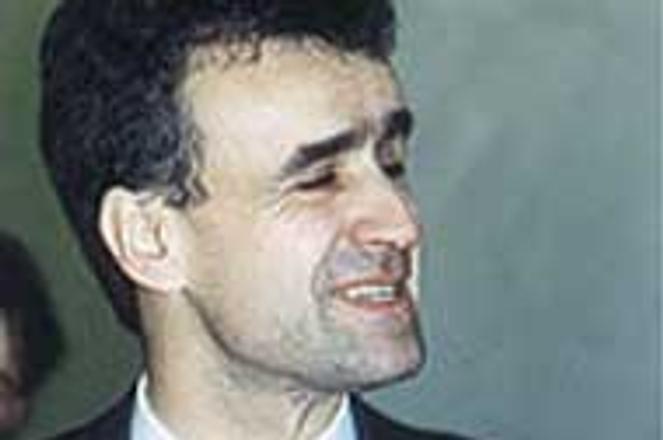All smiles. SDK politician Vladimír Palko has left his mother party for the KDH.photo: Vladimír Hák-Profit
A conservative faction within the ruling SDK party decided on January 9 to re-establish their lapsed Christian Democratic Movement (KDH) as a viable political party by allowing SDK deputies simultaneously to hold KDH membership. Political analysts said that far from destabilising the ruling coalition, the decision actually strengthened the government by allowing SDK deputies to fly their political colours with clear consciences.
"This decision has stopped the process of SDK disintegration," said Grigorij Mesežnikov, a political scientist with the Institute for Public Affairs. "It increases stability within the SDK, and means that the party has a real chance to remain the strongest element within the government coalition."
The decision to allow dual party membership, taken at the January 9 KDH Council meeting, allows SDK members to hold KDH membership but restricts them from holding high positions within the Christian Democratic Party. The move resolves the nagging question of how the SDK would manage to stay intact while accomodating the political ambitions of its members.
The SDK was originally a coalition of five parties which united to defeat former Prime Minister Vladimír Mečiar in September 1998 elections. It was forced to become a single party last May, however, when the Mečiar cabinet forced through a revision to the election law that seriously handicapped the election chances of coalition blocs.
In order to become members of the new SDK party, deputies of the five constituent parties first had to resign from their original parties, a step which caused much grumbling among KDH politicians, whose party had been the strongest of the five member coalition and who had the most to lose as their party's identity was subsumed in the new SDK
Following their September election success, former KDH members within the SDK began to lobby for reform of the SDK now that Mečiar, the stimulus for unity, had been vanquished. The KDH Council verdict thus satisfied the need for reform while preventing a full-scale disintegration of the strongest government party.
Striking compromise
Prime Minister Mikuláš Dzurinda is one politician who is perhaps most affected by the decision. As chairman of the SDK and former vice-chairman of the KDH, Dzurinda has had since the formation of the government in October to accomodate the demands of powerful former KDH party mates like Justice Minister Ján Čarnogurský while preventing the breakup of the SDK as a political party.
Čarnogurský leads an ultra-conservative wing of the Christian Democrats that had until January been pushing for a return to the SDK as a five-party coalition, something that Dzurinda had steadfastly opposed. "A return to a five-party coalition within the SDK would in fact mean its end," the Prime Minister said on several occasions.
For Dzurinda, the dual membership decision came as something of a godsend. "Until now, members of the KDH could not be members of another political party," he said, "but the council's decision allows them to be members of the SDK."
Even Čarnogurský seemed mollified by the council's decision. "This will secure government stability and at the same time permit the full functioning of the KDH," he said, adding that politicians who want to be KDH members will no longer suffer discrimination.
Not satisfied
Dual membership did not satisfy some of the more militant KDH old guard, however. Two days after the council's decision, Vladimír Palko, a former KDH vice chairman turned SDK deputy, left the SDK to return to his old party. He remains a member of the SDK parliamentary club, however, which allows him to keep his seat in parliament.
"Palko's move definitely shows that he wants to apply for a top position in his mother party," said Mesežnikov, adding that Palko's initiative might be followed by many more former members of the KDH who wished to establish themselves more clearly as Christian Democrat politicians.
Palko didn't deny his ambitions to return to his old job as KDH vice chairman. "I'm not entering the KDH to get that post, but I admit my interest in it," he said.
But Palko's defection has another, more troubling side - the possibility that deputies who leave the SDK for the KDH may not feel bound to honour the coalition agreement that the SDK signed with its three other government partners in October.
Appearing on TV Markíza's SITO discussion programme on January 11, Palko declared his refusal to support the Presidential candidacy of Rudolf Schuster, head of the coalition Party for Civil Understanding (SOP). The four coalition parties had committed to supporting Schuster in the coalition agreement signed on October 29, but Palko said he had 'moral barriers' against supporting a man who served in the top echelons of the Communist Party before 1989.
Partners worried
For now, Palko's apostasy has not spread to other KDH members. Čarnogurský reaffirmed his support for Schuster, but added that "the KDH defends each member's right to speak on any issue whatsoever."
Palko's coalition partners, however, were less indulgent. Peter Weiss, vice chairman of the former communist SDĽ party, said on SITO that "the SDĽ signed the coalition agreement with the SDK party, not the KDH," and asked Palko how many other articles of the agreement he would permit himself to question.
Béla Bugár, deputy speaker of parliament and chairman of the Hungarian Coalition Party (SMK), said that Palko's actions disappointed voters who had supported the SDK, and added that his public criticisms of Schuster showed poor political judgement. "If someone gets a post during negotiations and you don't like it, you keep that to yourself and face voters with a smile," he told Palko. "You are not obliged to campaign for Schuster, but by campaigning against him, you are going against the agreement."


